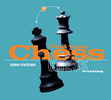I wanted to send in just the words "I flunked" as the entire column for this week's ChessBase Workshop. But you wouldn't find that to be terribly informative, Rainer would start wondering why he sends me a check, and I'd feel just a little bit guilty (despite the fact that I'd be laughing regardless).
Test Your Chess is a new ChessBase training CD by Henrik Schloessner (which is technically not how you spell his name, but to do it correctly I'd have to look up HTML tags for special characters and in the last paragraph I already said that I was going to send in just a two word preview, so how motivated do you think I am? I've Anglicized it. If I ever meet Henrik I'll say I'm sorry and buy him a beer). It's a CD which contains a single database made up of 555 chess exercises.
Now that may not sound like many to some folks, but Test Your Chess will keep you busy for quite a while. There's a new feature in ChessBase 9 which allows users to create "multiple choice" timed training questions (as opposed to the "find the best move" training questions we're all familiar with):

Instead of making a move on the chessboard, you instead click the radio button next to your chosen answer in the multiple choice box (right above the clock in the Training Question window -- see the illustration above). Test Your Chess makes extensive (and, from what I've seen so far, exclusive) use of this new training feature. Instead of just picking the best choice for the moving side, you'll need to really study the board to determine what's actually going on and then select accordingly from the multiple answers provided.
It might sound easy, but it's not. In fact I reset my training score right before I made the screen shot so that you wouldn't see how badly I was doing. These questions aren't the easiest and they're dang sure not superficial "mate in one" problems. You're frequently asked to look at the whole board, calculate multiple lines of play, and then make a positional assessment based on your findings; that's why the training exercises tend to give you a fairly generous (yet realistic in terms of practical tournament play) amount of time in which to come up with your answer.
There are a bunch of different ways to use this CD. You can do the exercises in order, of course. You might do them randomly. You can also tackle them by theme -- a special key (located, curiously, under the "Annotator" tab) allows you to select exercises by themed grouping. Here's the breakdown of themes and the number of training games in each category:
- Attack -- 132
- Mistake -- 52
- Winning material -- 74
- Positional evaluation -- 170
- Stress -- 66
- Defense -- 33
Don't be fooled by some of these theme categories. For example, "Mate" problems aren't mate-in-one exercises. You're asked to find the best move which launches a forced multi-move mating attack, so you'll need to calculate the full mating sequence in your head before answering. And the author often provides three concrete moves as options plus the entry "another move" as the fourth choice; you'll be surprised at how often "another move" is the answer, and it's an "obvious" move that you overlook because you're concentrating on the three incorrect concrete candidates. Sneaky, very sneaky.
And "Stress" is just exactly that -- a category designed to simulate time trouble in tournament play. You have just thirty seconds to come up with the correct answer (as opposed to five minutes for the problems in other categories). The problems are really no easier; you just have less time to solve them. And I've discovered I must be some kind of mutant "time trouble junkie" -- I actually do better on the "Stress" exercises than I do on the others.
The 555 exercises on this disk aren't "cooked up" chess problems, either. All are practical examples taken from actual tournament play and you'll see a lot of familiar names in the player list.
Test Your Chess isn't really an "instructional" CD in the classic sense; there are no chess lessons in the database. But in a practical sense Test Your Chess just might be the most instructive CD ChessBase offers: you'll discover just how much you don't know, and this will provide you with valuable pointers as to what areas of the game you should be studying in order to improve your deficiencies.
By the way, the CD ships with a copy of ChessBase Reader, so no other software is required.
Until next week, have fun!
© 2005, Steven A. Lopez. All rights
reserved.
























